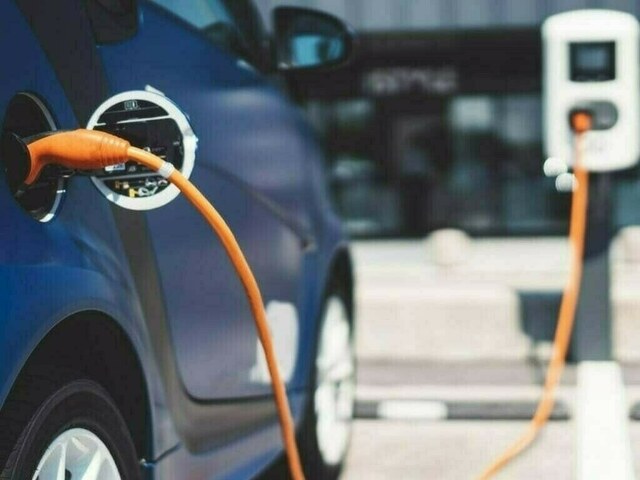LAHORE: The 2nd Electric Vehicles (EV) conference held in Lahore on Saturday brought together industry leaders, policymakers, financiers, and climate advocates to accelerate discussions around Pakistan’s EV landscape, highlighting the sector’s promise and challenges.
Organized by the Climate Action Centre (CAC) and PakEVO, and sponsored by Bank of Punjab, the conference marked an important step in aligning public and private efforts to foster EV adoption and localization in the country.
Umer Khan, Head Investment Banking, FI & Corporate Banking Central at Bank of Punjab in his keynote expressed confidence about the prospects of EV and allied infrastructure in Pakistan.
“Consistent with experience in several countries of the world, the big push and impetus on EV adoption and conversion would come with tangible government support in the form of subsidies and tax credits,” he said.
“Further, there are significant pools of liquidity and credit enhancements available for climate finance and EV projects, which need to be accessed with the right pitch to international DFIs,” he added.
In his keynote, Dr. Aazir Khan introduced PakKEVO, a newly launched initiative aimed at promoting EV-related education, collaboration, and policy reform. He underlined the missed opportunities of past years when Pakistan’s economic situation prevented budget allocations to key EV initiatives.
“We must ensure that fiscal priorities align with sustainable energy goals, especially when climate resilience and green infrastructure are no longer optional,” Dr Aazir emphasized.
The discussions revealed that while global EV sales grew by nearly 40% between 2023 and 2024, Pakistan’s market penetration remains dismally low. Yet the mood remained cautiously optimistic as several developments signalled momentum. Among them was Daewoo’s ambitious plan to replace diesel buses with EVs on shorter intercity routes such as between cities close to Lahore such as Sialkot.
“Our goal is that within the next two years, we will convert our entire short-route fleet to electric,” Sheriar Hassan from Daewoo said during the first panel, adding that financing collaborations with BOP are already underway.
Distribution companies (DISCOs) also face serious capacity and load management challenges, making long-route EV bus operations currently unfeasible. Sheriar noted that while Daewoo successfully initiated its first electric bus pilot project between Lahore and Sialkot, the larger intercity network such as Islamabad and Lahore will require time and significant investment to scale.
Panellists also highlighted that Pakistan has a strong opportunity to leapfrog into a regional EV manufacturing hub. Localization emerged as a central theme, with Nauman Alvi of EVEE Motors pointing out that the surge in two-wheeler sales — 1.4 million units in 2024 — was largely because of local production of affordable 70cc and 125cc models.
He called for similar localization efforts for EV parts, beginning with plastic parts that account for 15-20% of vehicle costs, and stressed that widespread EV adoption hinges on achieving economies of scale.
Noman Alvi shared insights from the company’s experience, highlighting that 20% of EV users in Pakistan are women compared to less than 1% in traditional automotive markets, showing that female education and awareness campaigns are crucial for driving adoption.
In her remarks, DFML key official Saleha Hassan challenged the misconception that EVs are merely luxury vehicles, saying, “It’s a utility decision — you invest in EVs because you invest in lifestyle change.”
She added that hatchbacks represent 52% of the EV market, demonstrating strong consumer preference. Saleha’s company DFML is making the hatchback EV Honri. She also said that CBUs should be discouraged while CKD assembly is something the government should support.
Despite these encouraging signals, major hurdles persist. Pakistan’s charging infrastructure remains underdeveloped, limiting EVs largely to short-distance, urban commutes.
Financing barriers add another layer of complexity. Globally, high battery costs (constituting 30-40% of EV expenses) and uncertainties around resale values deter buyers. In Pakistan, the situation is compounded by economic instability, high interest rates, and a scarcity of consumer financing options. However, success stories such as the CM Punjab’s Interest-Free Bike Scheme offer replicable models for wider EV financing programs.
The conference also explored innovative financing mechanisms like green bonds, battery leasing, and partnerships between public and private sectors. Panellists cited global examples like the US Inflation Reduction Act and Europe’s zero-interest loans to show how strategic financing can catalyze EV ecosystems.
Speakers unanimously agreed that strong policy support and collaboration between government, financiers, and manufacturers are pivotal. Yasir Husain, Director at CAC and the chief organizer of the conference, said, “Climate action needs to move from buzzwords to boardrooms, from talks to transactions — and EVs provide a bridge between economic resilience and environmental responsibility.”
Throughout the sessions, voices from the manufacturing and financial sectors underscored that local assembly initiatives can position the country as a strategic export hub. Localization of battery production is also expected to begin soon, promising a more sustainable supply chain.
Zulfiqar Younas from the Ministry of Climate Change and Dr. Umer Masud, Secretary of the Ministry of Industries and Production (MoIP) also spoke on the occasion.
The conference concluded on a high note, with participants emphasizing the need for urgent, coordinated action to capitalize on the sector’s potential. With the global EV market expanding and Pakistan’s youth-driven demographics offering a ripe consumer base, stakeholders agreed that the time for piecemeal efforts is over — a national EV ecosystem is no longer just an environmental goal, but an economic necessity.
Copyright Business Recorder, 2025


